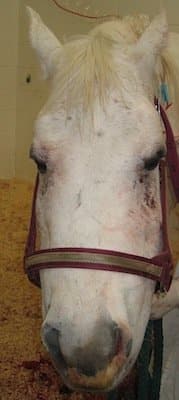Coagulopathies are common in association with crotalid (e.g., rattlesnake) envenomation. Additional concerns include thrombocytopenia, neurotoxicity, and cardiovascular toxicity.
Temporary tracheostomy should be performed immediately in a horse in severe respiratory distress due to upper airway obstruction. The physical examination and further supportive care can be delayed until after an airway is obtained.
Additional diagnostics include CBC/blood smear/serum biochemistry/coagulation profile. See hypofibrinogenemia, thrombocytopenia, prolonged prothrombin time, and increased FDPs. Might see echinocytes in heparin or citrate samples, and severity of echinocytosis is associated with severity of envenomation.
Rx: IV fluids for hypotension, NSAIDs for analgesia, steroids are controversial (1 dose early may be beneficial), tetanus prophylaxis, antimicrobial prophylaxis, antivenin if owner can afford it/it is available, and occasional blood transfusion. If you look closely at the picture of this horse, you can see he is receiving a blood transfusion.
Image courtesy of Nora Grenager, VMD, DACVIM.
